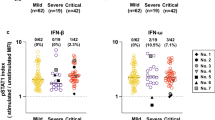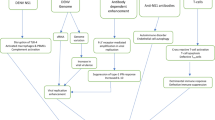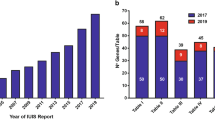Abstract
Pattern recognition receptors of the innate immune system, such as RIG-I and MDA5, are responsible for recognizing viruses and inducing interferon production. Genetic polymorphisms in the coding regions of RLR may be associated with the severity of COVID-19. Considering the contribution of the RLR signaling in immune-mediated reactions, this study investigated the association between three SNP in the coding region of IFIH1 and DDX58 genes with the susceptibility to COVID-19 in the Kermanshah population, Iran. 177 patients with severe and 182 with mild COVID-19 were admitted for this study. Genomic DNA was extracted from peripheral blood leukocytes of patients to determine the genotypes of two SNPs, rs1990760(C>T) and rs3747517(T>C) IFIH1 gene and rs10813831(G>A) DDX58 gene using PCR–RFLP method. Our results showed that the frequency of the AA genotype of rs10813831(G>A) was associated with susceptibility to COVID-19 compared to the GG genotype (p = 0.017, OR = 2.593, 95% CI 1.173–5.736). We also observed a statistically significant difference in the recessive model for SNPs rs10813831 variant (AA versus GG + GA, p = 0.003, OR = 2.901, 95% CI 1.405–6.103). Furthermore, No significant association was found between rs1990760 (C>T) and rs3747517(T>C) of IFIH1 gene polymorphisms with COVID-19. Our findings suggest that DDX58 rs10813831(A>G) polymorphism may be associated with COVID-19 severity in the Kermanshah population, Iran.



Similar content being viewed by others
Data availability
The datasets used and analyzed during the current study are available from the corresponding author on reasonable request.
Abbreviations
- MDA5:
-
Melanoma differentiation-associated protein 5
- RIG-I:
-
Retinoic acid-inducible gene I
- SARS-COV-2:
-
Severe acute respiratory syndrome coronavirus 2
- IFN:
-
Interferon
- RLR:
-
Retinoic acid-inducible gene-I (RIG-)-like receptors
- NLR:
-
Nucleotide Oligomerization Domain (NOD)-like receptors
- SNP:
-
Single nucleotide polymorphisms
- ARDS:
-
Acute respiratory disease syndrome
- PRR:
-
Pattern recognition receptors
- IFIH1 :
-
Interferon-Induced Helicase 1
- DDX58 :
-
DExD/H-box helicase 58
- ARDS:
-
Acute respiratory distress syndrome
- RFLP:
-
Polymerase chain reaction-restriction fragment length polymorphism
- MAF:
-
Minor allele frequency
- COVID-19:
-
Coronavirus disease-2019
- OR:
-
Odds ratio
References
Alagarasu K, Memane R, Shah P (2015) Polymorphisms in the retinoic acid-1 like-receptor family of genes and their association with clinical outcome of dengue virus infection. Adv Virol 160:1555–1560
Amado-Rodríguez L, Del Riego ES, de Ona JG, Alonso IL, Gil-Pena H, López-Martínez C, Martín-Vicente P, Lopez-Vazquez A, Lopez AG, Cuesta-Llavona E (2022) Effects of IFIH1 rs1990760 variants on systemic inflammation and outcome in critically ill COVID-19 patients in an observational translational study. Elife 11:e73012
Amado-Rodriguez L, del Riego ES, de Ona JG, Lopez-Alonso I, Gil-Pena H, Lopez-Martinez C, Martin-Vicente P, Lopez-Vazquez A, Lopez AG, Cuesta-Llavona E (2021) IFIH1 rs1990760 variants, systemic inflammation and outcome in critically-ill COVID-19 patients. medRxiv
Bastard P, Rosen LB, Zhang Q, Michailidis E, Hoffmann H-H, Zhang Y, Dorgham K, Philippot Q, Rosain J, Béziat V (2020) Autoantibodies against type I IFNs in patients with life-threatening COVID-19. Science 370:eabd4585
Biggins SW, Trotter J, Gralla J, Burton JR Jr, Bambha KM, Dodge J, Brocato M, Cheng L, McQueen M, Forman L (2013) Differential effects of donor and recipient IL28B and DDX58 SNPs on severity of HCV after liver transplantation. J Hepatol 58:969–976
Biswas M, Rahaman S, Biswas TK, Haque Z, Ibrahim B (2021) Association of sex, age, and comorbidities with mortality in COVID-19 patients: a systematic review and meta-analysis. Intervirology 64:36–47
Cao Y, Li L, Feng Z, Wan S, Huang P, Sun X, Wen F, Huang X, Ning G, Wang W (2020) Comparative genetic analysis of the novel coronavirus (2019-nCoV/SARS-CoV-2) receptor ACE2 in different populations. Cell Discov 6:1–4
Chistiakov DA (2010) Interferon induced with helicase C domain 1 (IFIH1) and virus-induced autoimmunity: a review. Viral Immunol 23:3–15
Creagh EM, O’Neill LA (2006) TLRs, NLRs and RLRs: a trinity of pathogen sensors that co-operate in innate immunity. Trends Immunol 27:352–357
De Wit E, Van Doremalen N, Falzarano D, Munster VJ (2016) SARS and MERS: recent insights into emerging coronaviruses. Nat Rev Microbiol 14:523–534
Dieter C, de Almeida Brondani L, Lemos NE, Schaeffer AF, Zanotto C, Ramos DT, Girardi E, Pellenz FM, Camargo JL, Moresco KS (2022) Polymorphisms in ACE1, TMPRSS2, IFIH1, IFNAR2, and TYK2 genes are associated with worse clinical outcomes in COVID-19. Genes 14:29
Fumagalli M, Cagliani R, Riva S, Pozzoli U, Biasin M, Piacentini L, Comi GP, Bresolin N, Clerici M, Sironi M (2010) Population genetics of IFIH1: ancient population structure, local selection, and implications for susceptibility to type 1 diabetes. Mol Biol Evol 27:2555–2566
Gorman JA, Hundhausen C, Errett JS, Stone AE, Allenspach EJ, Ge Y, Arkatkar T, Clough C, Dai X, Khim S (2017) The A946T variant of the RNA sensor IFIH1 mediates an interferon program that limits viral infection but increases the risk for autoimmunity. Nat Immunol 18:744–752
Harrison AG, Lin T, Wang P (2020) Mechanisms of SARS-CoV-2 transmission and pathogenesis. Trends Immunol 41:1100–1115
Hu J, Nistal-Villán E, Voho A, Ganee A, Kumar M, Ding Y, García-Sastre A, Wetmur JG (2010) A common polymorphism in the caspase recruitment domain of RIG-I modifies the innate immune response of human dendritic cells. J Immunol 185:424–432
Huang C, Wang Y, Li X, Ren L, Zhao J, Hu Y, Zhang L, Fan G, Xu J, Gu X (2020) Clinical features of patients infected with 2019 novel coronavirus in Wuhan, China. Lancet 395:497–506
Imaizumi T, Arikawa T, Sato T, Uesato R, Matsumiya T, Yoshida H, Ueno M, Yamasaki S, Nakajima T, Hirashima M (2008) Involvement of retinoic acid-inducible gene-I in inflammation of rheumatoid fibroblast-like synoviocytes. Clin Exp Immunol 153:240–244
Junior AGD, Sampaio NG, Rehwinkel J (2019) A balancing act: MDA5 in antiviral immunity and autoinflammation. Trends Microbiol 27:75–85
Kassir R (2020) Risk of COVID‐19 for patients with obesity. Obes Rev 21(6):e13034. https://doi.org/10.1111/obr.13034
Kato H, Takeuchi O, Mikamo-Satoh E, Hirai R, Kawai T, Matsushita K, Hiiragi A, Dermody TS, Fujita T, Akira S (2008) Length-dependent recognition of double-stranded ribonucleic acids by retinoic acid-inducible gene-I and melanoma differentiation-associated gene 5. J Exp Med 205:1601–1610
Kato H, Takeuchi O, Sato S, Yoneyama M, Yamamoto M, Matsui K, Uematsu S, Jung A, Kawai T, Ishii KJ (2006) Differential roles of MDA5 and RIG-I helicases in the recognition of RNA viruses. Nature 441:101–105
Kennedy RB, Ovsyannikova IG, Haralambieva IH, O’Byrne MM, Jacobson RM, Pankratz VS, Poland GA (2012) Multigenic control of measles vaccine immunity mediated by polymorphisms in measles receptor, innate pathway, and cytokine genes. Vaccine 30:2159–2167
Li X, Geng M, Peng Y, Meng L, Lu S (2020) Molecular immune pathogenesis and diagnosis of COVID-19. J Pharm Anal 10:102–108
Liu S, Wang H, Jin Y, Podolsky R, Reddy MPL, Pedersen J, Bode B, Reed J, Steed D, Anderson S (2009) IFIH1 polymorphisms are significantly associated with type 1 diabetes and IFIH1 gene expression in peripheral blood mononuclear cells. Hum Mol Genet 18:358–365
Maiti AK (2020) The African-American population with a low allele frequency of SNP rs1990760 (T allele) in IFIH1 predicts less IFN-beta expression and potential vulnerability to COVID-19 infection. Immunogenetics 72:387–391
Marr N, Hirschfeld AF, Lam A, Wang S, Lavoie PM, Turvey SE (2014) Assessment of genetic associations between common single nucleotide polymorphisms in RIG-I-like receptor and IL-4 signaling genes and severe respiratory syncytial virus infection in children: a candidate gene case–control study. PLoS ONE 9:e100269
Minashkin MM, Grigortsevich NY, Kamaeva AS, Barzanova VV, Traspov AA, Godkov MA, Ageev FA, Petrikov SS, Pozdnyakova NV (2022) The role of genetic factors in the development of acute respiratory viral infection COVID-19: predicting severe course and outcomes. Biomedicines 10:549
Mohamed Khosroshahi L, Rezaei N (2021) Dysregulation of the immune response in coronavirus disease 2019. Cell Biol Int 45:702–707
Nejentsev S, Walker N, Riches D, Egholm M, Todd JA (2009) Rare variants of IFIH1, a gene implicated in antiviral responses, protect against type 1 diabetes. Science 324:387–389
Pang L, Gong X, Liu N, Xie G, Gao W, Kong G, Li X, Zhang J, Jin Y, Duan Z (2014) A polymorphism in melanoma differentiation-associated gene 5 may be a risk factor for enterovirus 71 infection. Clin Microbiol Infect 20:O711–O717
Rehwinkel J, Gack MU (2020) RIG-I-like receptors: their regulation and roles in RNA sensing. Nat Rev Immunol 20:537–551
Schneider WM, Chevillotte MD, Rice CM (2014) Interferon-stimulated genes: a complex web of host defenses. Annu Rev Immunol 32:513
Schoggins JW (2019) Interferon-stimulated genes: what do they all do? Annu Rev Virol 6:567–584
Suguna S, Nandal D, Kamble S, Bharatha A, Kunkulol R (2014) Genomic DNA isolation from human whole blood samples by non enzymatic salting out method. Int J Pharm Pharm Sci 6:198–199
Takaoka A, Yamada T (2019) Regulation of signaling mediated by nucleic acid sensors for innate interferon-mediated responses during viral infection. Int Immunol 31:477–488
Totura AL, Baric RS (2012) SARS coronavirus pathogenesis: host innate immune responses and viral antagonism of interferon. Curr Opin Virol 2:264–275
Wu X, Zang F, Liu M, Zhuo L, Wu J, Xia X, Feng Y, Yu R, Huang P, Yang S (2019) Genetic variants in RIG-I-like receptor influences HCV clearance in Chinese Han population. Epidemiol Infect 147:e195. https://doi.org/10.1017/S0950268819000827
Wu X, Zang F, Liu M, Zhuo L, Wu J, Xia X, Feng Y, Yu R, Huang P, Yang S (2019) Genetic variants in RIG-I-like receptor influences HCV clearance in Chinese Han population. Epidemiol Infect 147:e195
Yamada T, Sato S, Sotoyama Y, Orba Y, Sawa H, Yamauchi H, Sasaki M, Takaoka A (2021) RIG-I triggers a signaling-abortive anti-SARS-CoV-2 defense in human lung cells. Nat Immunol 22:820–828
Yoneyama M, Kikuchi M, Matsumoto K, Imaizumi T, Miyagishi M, Taira K, Foy E, Loo Y-M, Gale M, Akira S (2005) Shared and unique functions of the DExD/H-box helicases RIG-I, MDA5, and LGP2 in antiviral innate immunity. J Immunol 175:2851–2858
Acknowledgements
We thank the deputy of Research and Technology of Kermanshah University of Medical Sciences for financial support.
Funding
This research has been supported by Grants from Kermanshah University of Medical Sciences (Grant number: 4010493).
Author information
Authors and Affiliations
Contributions
AR: Conceptualization, Visualization and Writing—Review and Editing. PF: Writing—Original draft preparation. AGK and FS: formal analysis and Validation. Pf and SF: Investigation and performing the laboratory experiments. ZM, EF and MHZ: resources and preparing the samples. AR critically revised the manuscript and provided the final approval. All authors read and approved the final manuscript and had full access to all the data in the study.
Corresponding author
Ethics declarations
Conflict of interest
The authors declare that they have no competing interests.
Additional information
Edited by Hanna-Mari Baldauf.
Publisher's Note
Springer Nature remains neutral with regard to jurisdictional claims in published maps and institutional affiliations.
Rights and permissions
Springer Nature or its licensor (e.g. a society or other partner) holds exclusive rights to this article under a publishing agreement with the author(s) or other rightsholder(s); author self-archiving of the accepted manuscript version of this article is solely governed by the terms of such publishing agreement and applicable law.
About this article
Cite this article
Feizollahi, P., Zamanian, M.H., Falahi, S. et al. Association of IFIH1 and DDX58 genes polymorphism with susceptibility to COVID-19. Med Microbiol Immunol 212, 221–229 (2023). https://doi.org/10.1007/s00430-023-00764-x
Received:
Accepted:
Published:
Issue Date:
DOI: https://doi.org/10.1007/s00430-023-00764-x




